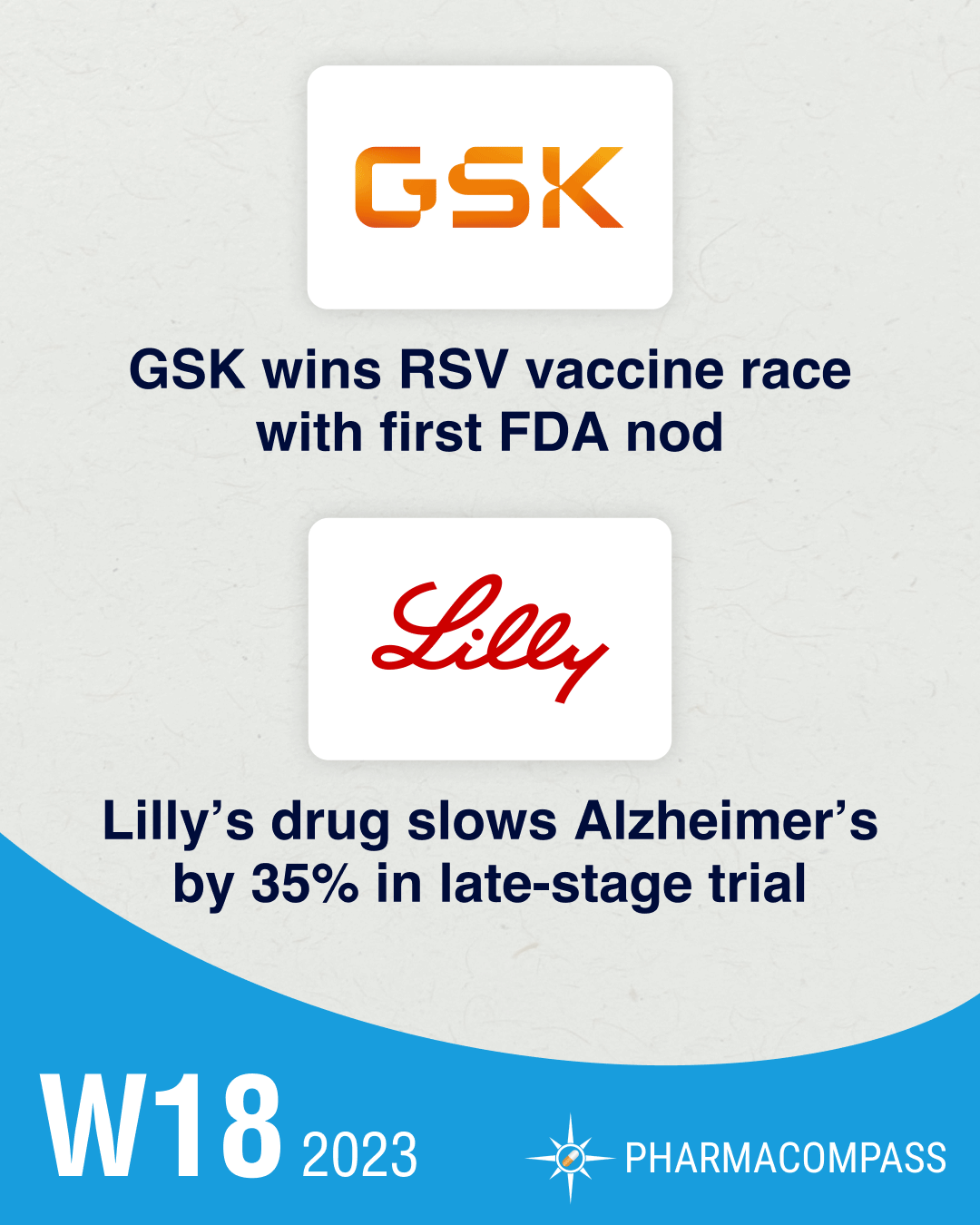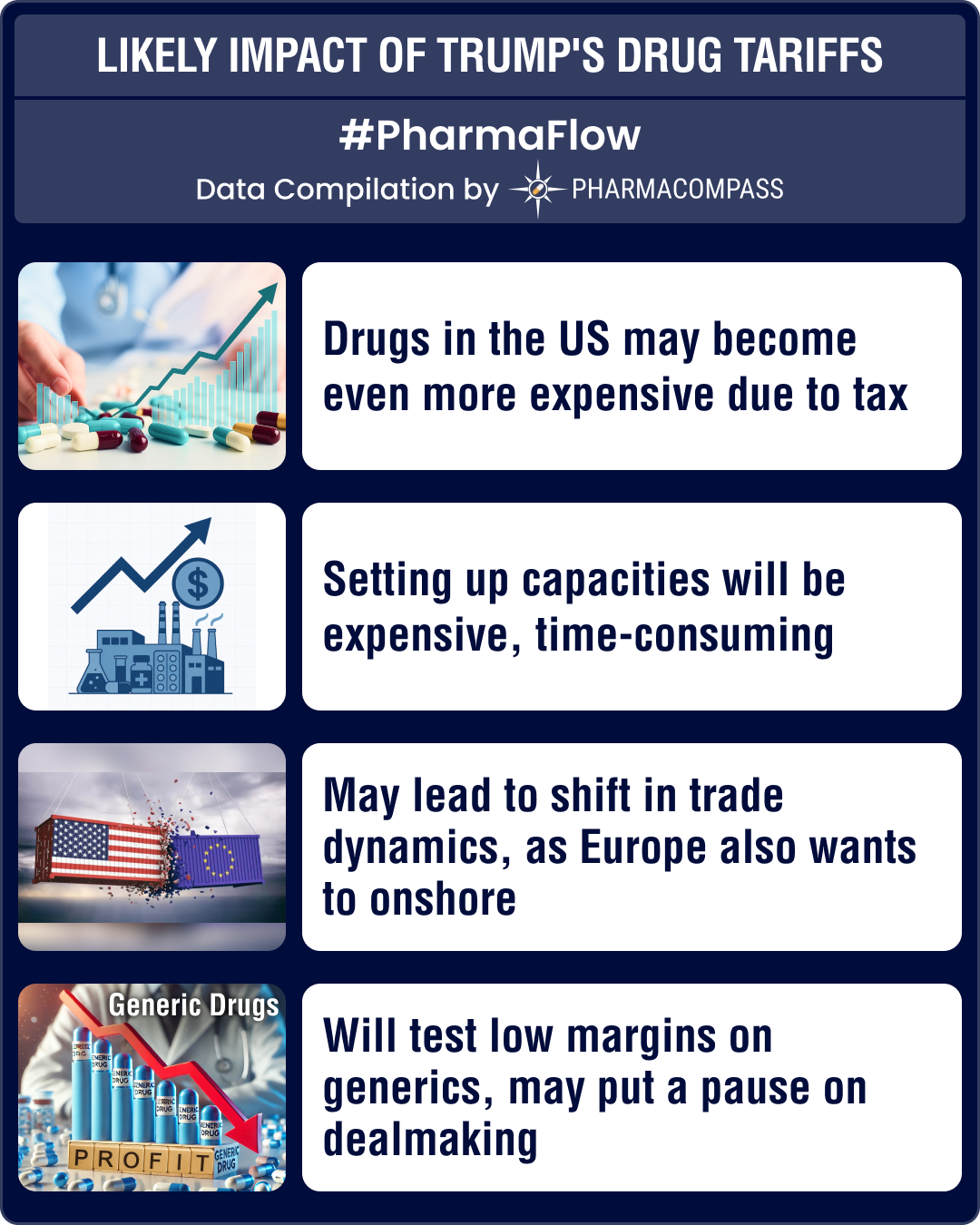
By PharmaCompass
2023-05-04
Impressions: 1,535
The US Food and Drug Administration (FDA) has approved GSK’s respiratory syncytial virus (RSV) vaccine – Arexvy – for people aged 60 and older, making it the first vaccine approved for protection against the disease. FDA has also approved Pfizer’s 20-valent pneumococcal disease vaccine – Prevnar 20 – in children aged six weeks to 17 years. Two long-acting injections for the treatment of schizophrenia in adults, one from Otsuka and Lundbeck and the other from MedinCell and Teva, have also been approved by the agency.
Eli Lilly’s experimental Alzheimer’s disease drug – donanemab – has successfully met all goals in a late-stage study, effectively slowing the progression of Alzheimer’s by 35 percent compared to a placebo.
In M&A news, Japanese drugmaker Astellas Pharma is set to acquire New Jersey-based eye drug developer Iveric Bio for US$ 5.9 billion in cash.
In regulatory news, FDA has issued a Form 483 with five observations to Rentschler Biopharma’s Laupheim manufacturing site in Germany after it found issues relating to microbial contamination and procedural violations at its quality unit. The agency has also rejected Ascendis’ experimental hormone disorder therapy for hypoparathyroidism in adult patients and has issued a partial hold on Sun Pharma’s alopecia drug candidate after a trial patient experienced a lung blood clot.
A report by the US Centers for Disease Control and Prevention (CDC) has revealed that fentanyl-related deaths in the US jumped three folds between 2016 and 2021. And the US government and Gilead Sciences have moved court over the latter’s HIV-prevention drug regimen, with the former seeking over US$ 1 billion from Gilead for patent violations.
GSK overtakes Pfizer in bagging first FDA approval for RSV vaccine
FDA has approved GSK’s RSV vaccine for people aged 60 and older, making it the first vaccine approved in the US for protection against the disease. The approval puts GSK ahead of Pfizer, whose RSV vaccine is also expected to be approved by the FDA later this month.
The single-dose vaccine – Arexvy – demonstrated an overall efficacy of 82.6 percent and was around 94 percent effective against severe lower respiratory tract disease associated with RSV infection in people aged 60 and above in a late-stage trial. CDC’s panel of advisors on immunization will meet in June to decide how often the vaccine should be given. GSK said the vaccine would be priced above US$ 120 per shot.
Pfizer’s Prevnar 20 approved for kids: FDA has approved Pfizer’s 20-valent pneumococcal disease vaccine – Prevnar 20 – for preventing the disease in children aged six weeks to 17 years. This approval comes around 10 months after Merck’s 15-valent vaccine — Vaxneuvance — received the go-ahead in the same age group. Prevnar 20 has already been approved for use in adults.
Lilly’s donanemab slows Alzheimer’s by 35 percent in late-stage trial
Eli Lilly’s experimental Alzheimer’s drug — donanemab — slowed cognitive decline by 35 percent compared to a placebo in a late-stage trial. Lilly has said donanemab met all trial goals.
This is the strongest evidence yet that removing sticky amyloid plaques from the brain benefits patients with Alzheimer’s. Lilly plans to file for full approval by the end of June, and an FDA decision on the drug is likely around 2023-end or in early 2024. Earlier this year, a similar therapy from Biogen and Eisai — Leqembi — had bagged FDA nod for the treatment of Alzheimer’s disease.
Astellas Pharma to acquire eye drug developer Iveric Bio for US$ 5.9 billion
Japanese drugmaker Astellas Pharma will acquire New Jersey-based eye drug developer Iveric Bio for US$ 5.9 billion in cash. This deal is Astellas’ largest acquisition to date and will give Astellas access to Iveric Bio’s ophthalmology treatments, including its lead drug candidate Zimura (avacincaptad pegol), which recently succeeded in a pair of phase 3 trials for geographic atrophy (GA), a common form of vision loss in the elderly.
Meanwhile, Johnson & Johnson has acquired the rights to two experimental cell therapies for blood cancer from Cellular Biomedicine Group for US$ 245 million upfront. The treatments have shown positive early-phase results in patients with recurrent diffuse large B cell lymphoma (DLBCL), the most common form of non-Hodgkin lymphoma.
Xtandi achieves success in late-stage prostate cancer trial: Astellas and partner Pfizer said Xtandi, in combination with hormone therapy leuprolide, helped reduce the risk of tumor metastasis or death by 58 percent in men with non-metastatic hormone-sensitive prostate cancer (nmHSPC) with high-risk biochemical recurrence, compared to those who received leuprolide alone in a late-stage trial.FDA rejects Ascendis’ hormone disorder therapy for hypoparathyroidism
FDA has declined approval to Ascendis Pharma’s experimental hormone disorder therapy – TransCon PTH (palopegteriparatide) – for the treatment of hypoparathyroidism in adult patients due to concerns related to the manufacturing control of the drug and device combination that resulted in variability in the delivered dose of the product. Last month, the agency had identified deficiencies in Ascendis’ new drug application (NDA) for TransCon PTH.
Places Sun’s alopecia drug on partial hold: Sun Pharma’s alopecia drug candidate – deuruxolitinib – has been put on partial clinical hold by the FDA after a trial patient experienced a lung blood clot. Sun Pharma had acquired deuruxolitinib through its recent US$ 576 million acquisition of Concert Pharmaceuticals.
Issues Form 483 to Rentschler’s German site: FDA has issued a Form 483 with five observations to Rentschler Biopharma’s Laupheim manufacturing site in Germany after it found issues relating to microbial contamination and procedural violations at its quality unit. The inspection took place in late February and early March. Last year, FDA had issued a Form 483 with nine observations to the same facility.
Two long-acting injections for schizophrenia in adults receive FDA nod
FDA has approved two long-acting injections for the treatment of schizophrenia in adults. Otsuka and Lundbeck’s long-acting injectable version of Abilify, called Abilify Asimtufii (aripiprazole), has received a nod from the FDA. The drug, which can be administered once every two months, can also be used as a maintenance monotherapy treatment for bipolar I disorder in adults.
MedinCell and partner Teva have also received FDA approval for their schizophrenia treatment — Uzedy (risperidone).
Meanwhile, Avadel Pharmaceuticals’ narcolepsy drug Lumryz has received FDA approval. Lumryz has been specifically approved for the treatment of excessive daytime sleepiness, also known as cataplexy, in adult patients who have been diagnosed with narcolepsy.
CDC cites three-fold rise in deaths due to fentanyl overdose from 2016 to 2021
A US Centers for Disease Control and Prevention (CDC) report has revealed that fentanyl-related deaths in the US increased by over three times between 2016 and 2021. The CDC report showed that the rate of drug overdose deaths involving the synthetic opioid increased from 5.7 per 100,000 people in 2016 to 21.6 per 100,000 in 2021.
US govt seeks over US$ 1 billion from Gilead as share of profits from HIV combo
Gilead Sciences and the US government are set to battle it out in court for a share of profits from the pharmaceutical company’s HIV-prevention drug regimen. The US government is seeking over US$ 1 billion from Gilead, alleging that the CDC was not compensated for discovering that Gilead’s drug combination of emtricitabine and tenofovir (active ingredients in Truvada and Descovy) acts as pre-exposure prophylaxis (PrEP) to reduce the risk of HIV infection. The CDC patented the two-drug regimen between 2006 and 2007 and claims that Gilead refused to obtain a license to use the patented regimens. Gilead denies the allegations and argues that the patents are invalid.The PharmaCompass Newsletter – Sign Up, Stay Ahead
Feedback, help us to improve. Click here
Image Credit : Phisper Infographic by PharmaCompass license under CC BY 2.0
“ The article is based on the information available in public and which the author believes to be true. The author is not disseminating any information, which the author believes or knows, is confidential or in conflict with the privacy of any person. The views expressed or information supplied through this article is mere opinion and observation of the author. The author does not intend to defame, insult or, cause loss or damage to anyone, in any manner, through this article.”








